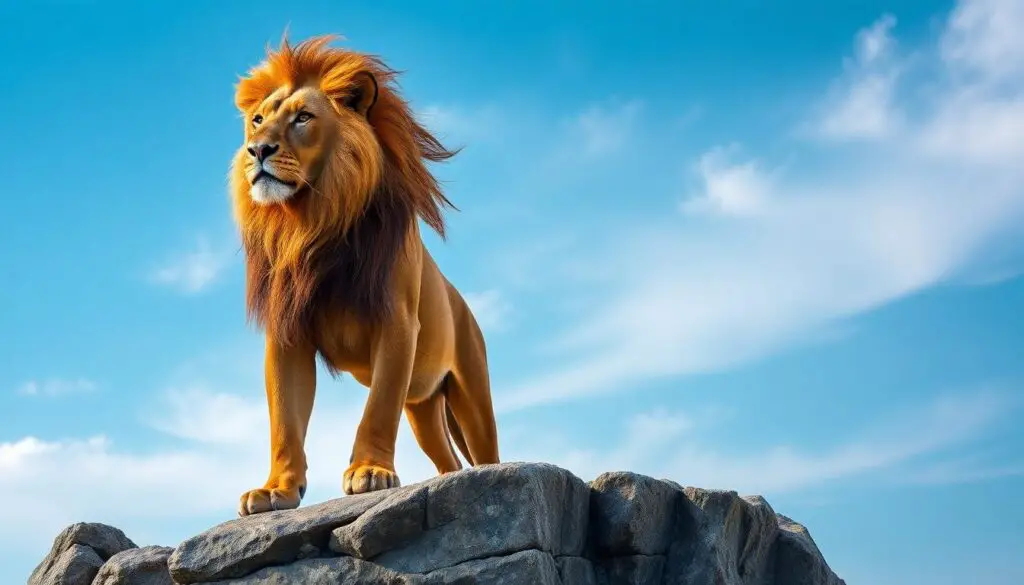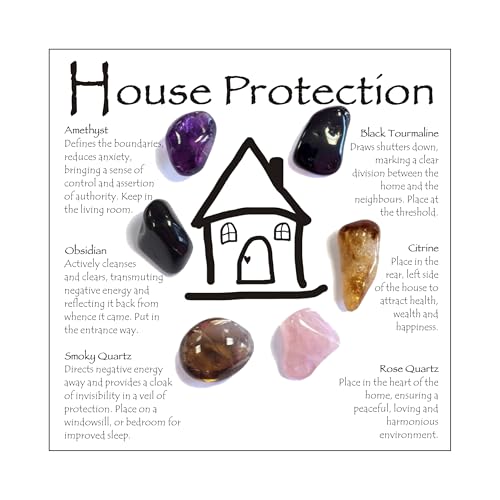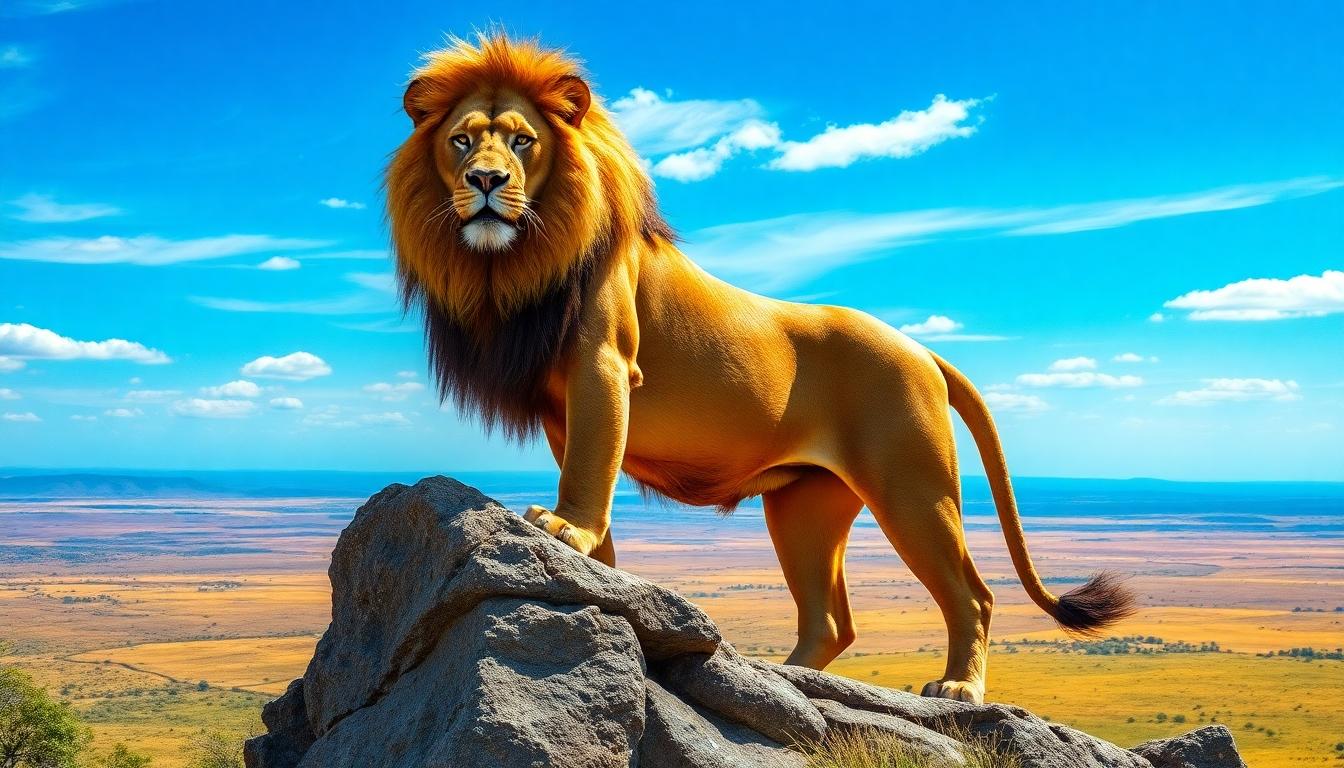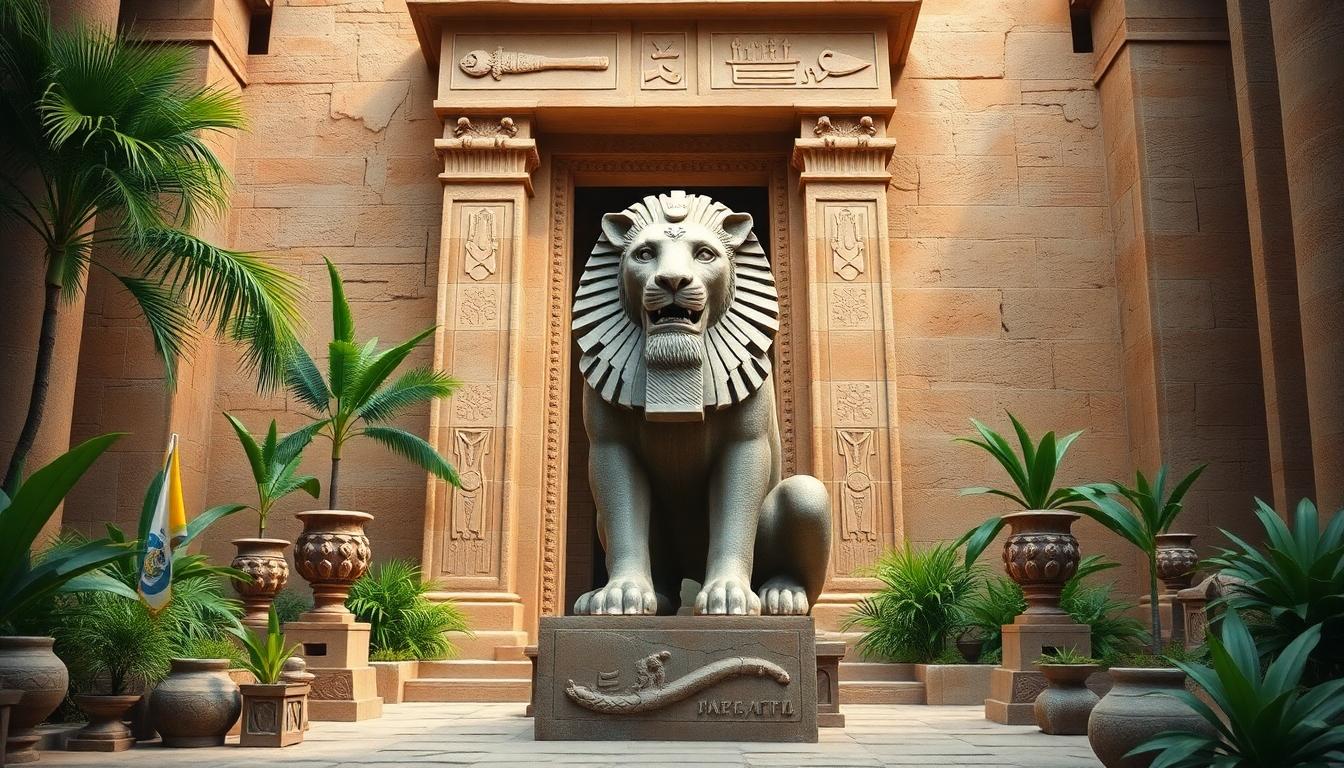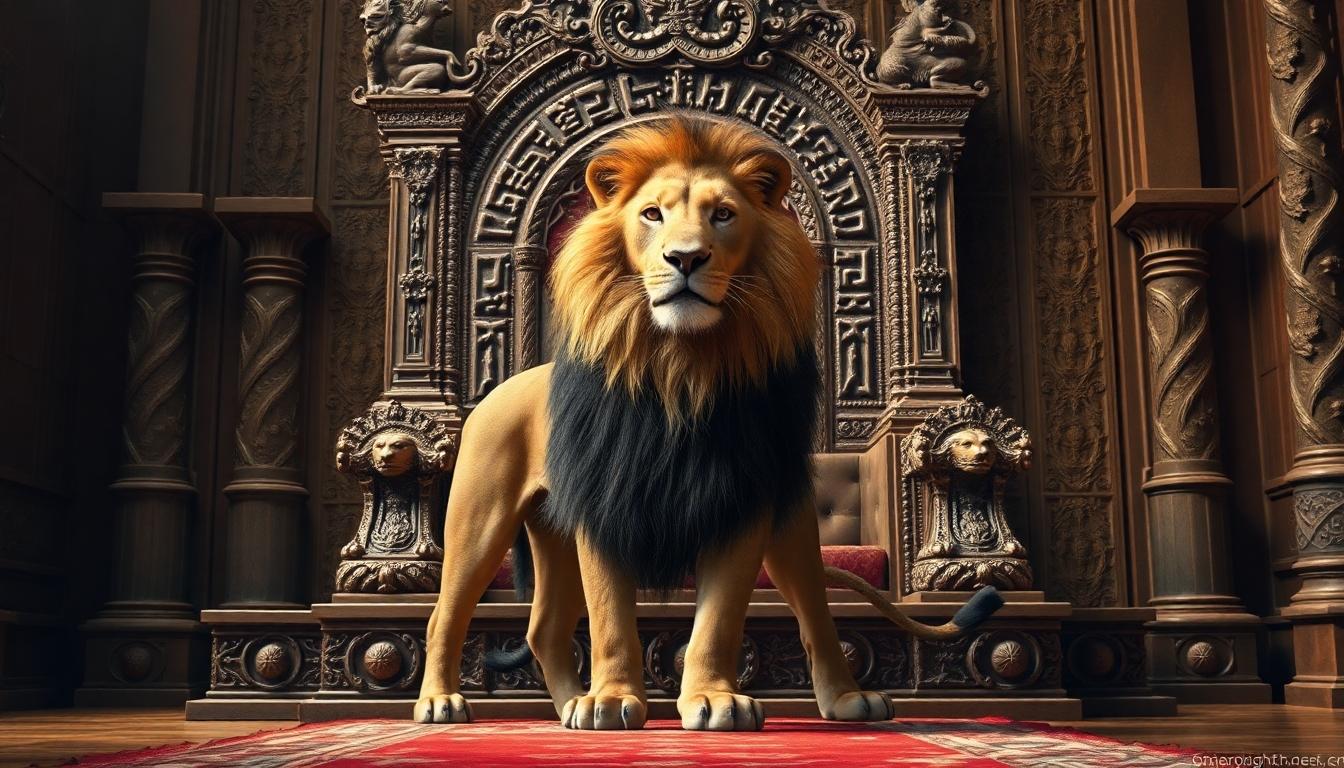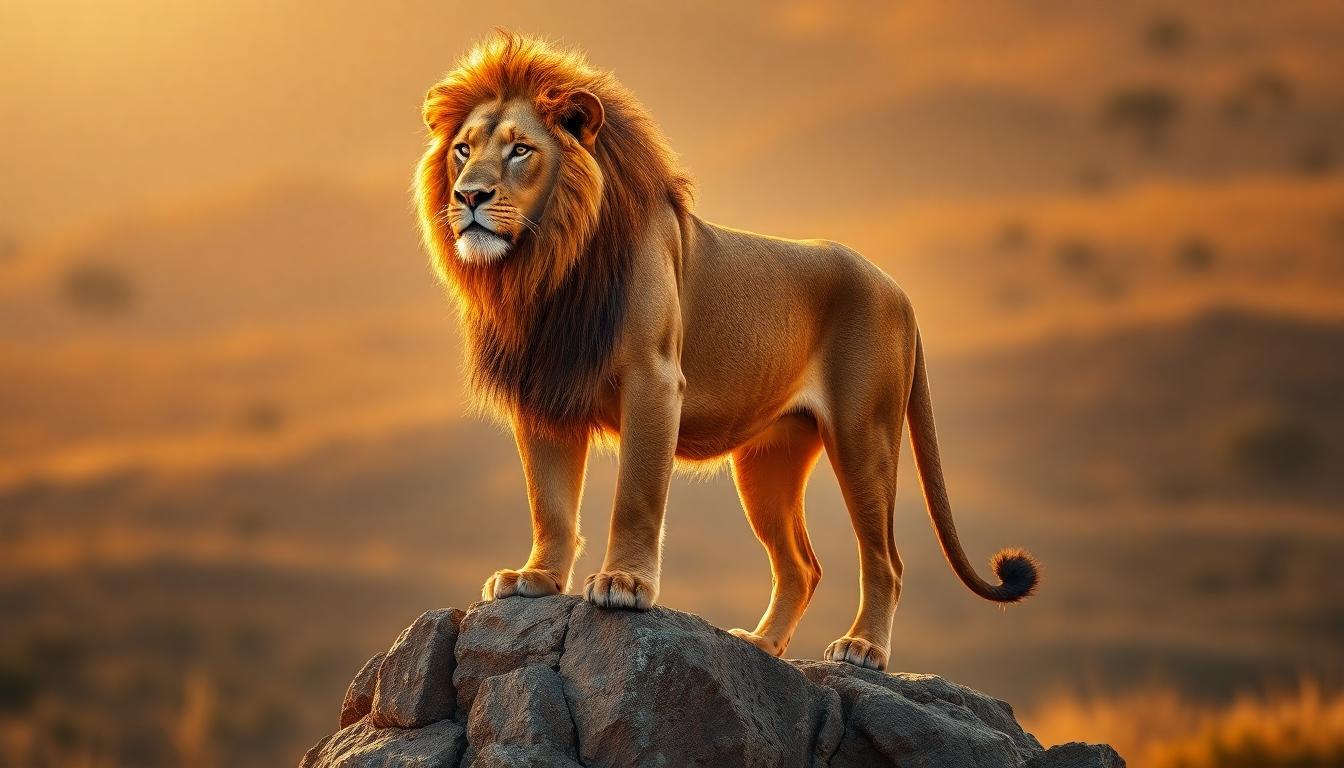Lions have captivated human imagination for thousands of years, standing as powerful symbols of strength, courage, and nobility across countless cultures. From ancient Egyptian deities to modern corporate logos, these majestic creatures continue to represent leadership and power in our collective consciousness.
We’ll explore the rich symbolic meaning of lions throughout history and how these magnificent animals have influenced art, literature, and spiritual traditions worldwide. Whether you’re researching lion symbolism for creative inspiration or personal growth, understanding these profound meanings can add depth to your appreciation of this iconic creature. Join us as we uncover the timeless significance that makes lions so much more than just impressive members of the animal kingdom.
The Powerful Lion: A Symbol Throughout History
Lions have captivated human imagination across civilizations for thousands of years. Ancient Egyptians revered lions as symbols of divine protection, featuring them prominently in their hieroglyphics and royal imagery. The Great Sphinx of Giza, with its lion’s body and human head, stands as testament to this profound reverence, dating back to approximately 2500 BCE.
In medieval Europe, lions emerged as powerful heraldic symbols representing nobility, courage, and royal lineage. Kings adopted the title “Lion-Hearted” to emphasize their bravery and strength in battle. Richard I of England, famously known as Richard the Lion-Hearted, exemplifies this association between lions and exceptional leadership qualities.
Eastern cultures incorporated lions into their symbolic language with equal significance. Chinese guardian lions (often called “Foo Dogs”) have protected temples, imperial palaces, and government buildings for centuries. Buddhist traditions feature lions as protectors of dharma, symbolizing the Buddha’s royal origins and his powerful spiritual voice—often referred to as the “lion’s roar.”
Literary traditions worldwide use lions as metaphors for human qualities and challenges. Aesop’s fables include many stories featuring lions representing power dynamics and moral lessons. C.S. Lewis’s Aslan character in “The Chronicles of Narnia” draws on the lion’s traditional associations with divinity, sacrifice, and resurrection.
Modern branding continues this ancient symbolism, with companies like MGM Studios and the Premier League adopting lion imagery to convey strength, excellence, and dominance in their fields. Sports teams across five continents incorporate lions into their logos and mascots, tapping into the universal recognition of lions as apex predators.
Lion as a Symbol of Courage and Strength
The lion stands as one of history’s most potent symbols of courage and strength across many civilizations. Throughout ancient and modern cultures, lions embody fearlessness and invincibility, earning them recognition as the fiercest of spirit animals.
Physical Attributes That Inspire Symbolism
Lions’ impressive physical characteristics directly contribute to their powerful symbolic associations. Their majestic manes create an imposing silhouette that instantly communicates authority and grandeur. Male lions boast muscular builds capable of taking down prey many times their size, demonstrating raw physical power that humans have long admired and sought to emulate. These natural attributes emphasize majesty and authority, reinforcing lions’ roles as universal symbols of power and might. The confident stance and piercing gaze of a lion further contribute to their representation as creatures of supreme dominance in their domain.
The Lion Heart in Cultural Expressions
References to the “lion heart” appear consistently across cultural expressions as shorthand for exceptional courage and inner strength. Ancient Greek mythology featured the legendary Nemean Lion, whose defeat marked one of Hercules’ twelve labors, highlighting the creature’s nearly supernatural power. Egyptian, Indian, and African cultures all incorporated lion imagery into their depictions of deities and rulers, transferring the animal’s perceived qualities to these figures. The concept of having a “lion heart” continues in modern contexts to symbolize resilience and determination, reflecting the animal’s fierce and protective nature. This association runs so deep that many royal families and nations have adopted lions in their heraldry and national symbols to communicate their strength and courage to allies and adversaries alike.
Lions in Ancient Mythology and Religion
Lions have served as powerful symbols across many ancient cultures, embodying divine characteristics and spiritual significance. Their majestic presence transcended mere animal representation to become embodiments of cosmic and religious principles throughout the ancient industry.
Egyptian Lion Deities and Symbols
Egyptian civilization venerated lions as sacred animals connected to the sun and the life-giving Nile floods. Sekhmet, the formidable lioness goddess, embodied both destructive and healing powers, serving as a protector of pharaohs and a symbol of royal might. Her dual nature represented both the fearsome heat of the desert and the restorative powers associated with divine protection. Wadjet, another important Egyptian deity, appeared in lioness form and symbolized protection and fertility, guarding the rulers of Egypt. Lion statues frequently adorned temple entrances and sacred spaces, functioning as eternal guardians against evil forces and chaos.
Greek and Roman Lion Symbolism
Ancient Greek mythology featured lions prominently in heroic narratives and divine associations. Heracles (known as Hercules by Romans) earned immortal fame through his defeat of the Nemean Lion, a seemingly invulnerable beast whose conquest symbolized the triumph of solar heroes over death itself. This legendary victory became the first of his twelve labors and established the lion skin as his iconic attribute. Dionysus, the god of wine and ecstasy, maintained connections with lions that represented wild passion and the untamed unconscious forces in human nature. Romans later adopted these symbolic associations, incorporating lions into their art, architecture, and religious iconography as emblems of imperial power and divine protection.
Lions in Eastern Religious Traditions
Buddhist traditions feature lions as noble guardians of dharma (spiritual law), often depicted flanking entrances to temples and sacred sites. These protective figures symbolize the Buddha’s courage and spiritual strength, with the “lion’s roar” representing the powerful proclamation of Buddhist teachings. Lion thrones frequently appear in Buddhist iconography, elevating enlightened beings above worldly concerns. In Hindu mythology, Narasimha, a half-lion, half-human avatar of Vishnu, embodies divine protection against evil forces, demonstrating how lion attributes merged with human form created powerful spiritual symbols. Throughout Asia, lion dance traditions continue these ancient associations, celebrating the protective and auspicious qualities lions have represented for thousands of years across Eastern religious frameworks.
Lions as Royal Emblems
Lions have served as powerful royal emblems throughout history, representing authority and sovereignty across diverse civilizations. Their majestic appearance and dominant nature have made them perfect symbols for monarchs seeking to convey power and legitimacy to their subjects and rivals alike.
The Lion in Heraldry and Coats of Arms
Lions dominate European heraldic tradition as the most frequently depicted animal, symbolizing nobility, military might, and justice. The “lion rampant” pose—showing the beast standing on its hind legs with forepaws raised—appears on countless family crests and national emblems as a declaration of bravery and strength. European coats of arms feature lions in various positions, each carrying exact symbolic meaning that communicates the bearer’s noble lineage and martial prowess. Royal families throughout Europe adopted lion imagery to establish visual connections to qualities like courage and leadership, making these magnificent creatures an enduring symbol of aristocratic power and prestige.
Lion Thrones and Royal Iconography
Ancient rulers incorporated lions into their ceremonial thrones and official regalia to visually reinforce their authority. In Assyria and Babylon, monarchs sat upon lion-shaped thrones, physically positioning themselves above these powerful beasts to demonstrate their supreme dominance. Egyptian pharaohs embraced lion imagery as symbols of protection and guardianship, connecting themselves to deities and divine power through this association. Lion statues frequently guarded palace entrances and royal tombs across multiple civilizations, serving as eternal sentinels protecting rulers in both life and death. The consistent presence of lions in royal iconography across cultures and time periods highlights humanity’s enduring recognition of these animals as the ultimate embodiment of power, creating an immediate visual shorthand for regal authority that transcends language barriers.
Spiritual and Psychological Symbolism of Lions
Lions embody powerful symbolic meanings across spiritual and psychological dimensions. Their presence in our consciousness represents much more than just physical attributes, carrying profound significance for personal development and self-understanding.
Lion Energy in Personal Growth
Lion energy fuels self-actualization and decisive leadership in personal development journeys. This powerful energy encourages individuals to embrace their innate strength, overcome persistent fears, and trust their capabilities particularly during groundbreaking life phases. Lions’ protective nature fosters resilience, teaching us to establish healthy boundaries and prioritize personal well-being without apology. Their symbolic presence in our lives reminds us of our capacity for courage and authenticity, inspiring us to step into our power with confidence rather than shrinking from challenges. Many spiritual traditions view connecting with lion energy as a pathway to accessing deeper levels of self-assurance and personal sovereignty in everyday life.
Dream Interpretations of Lions
Dreams featuring lions typically reflect inner strength, unaddressed challenges, or dormant leadership qualities waiting to be expressed. A roaring lion appearing in dreamscapes often signals suppressed emotions or a subconscious need to assert dominance in waking life. Calm lions suggest mastery over personal fears and anxieties, representing internal balance and confidence. Aggressive lions in dreams serve as warnings about external threats or unresolved internal conflicts requiring attention. Lionesses specifically symbolize protective instincts and nurturing energy, often appearing during periods when these qualities need development or recognition. Encounters with lion prides emphasize the importance of community support and collaborative success, highlighting that even the strongest individuals benefit from meaningful connections. Dream analysts note that recurring lion dreams frequently coincide with periods of important personal transition or opportunities for leadership.
Modern Cultural Representations of Lion Symbolism
Lions continue to reign as universal symbols of power, leadership, and nobility in contemporary culture. Their iconic imagery transcends time, appearing in various modern contexts from government institutions to artistic interpretations, each reinforcing their status as emblems of authority and moral strength.
Lions in Literature and Film
In modern literature, lions represent powerful archetypes that communicate leadership and familial bonds. C.S. Lewis masterfully employed lion symbolism in “The Chronicles of Narnia,” where Aslan stands as a moral authority embodying courage and self-sacrifice. His character demonstrates how lion imagery connects to deeper themes of redemption and ethical governance within fictional narratives. Lion prides often mirror societal structures, showcasing complex dynamics of protection, leadership, and community that resonate with human social organization. Literary lions frequently represent dualities—combining fierce power with noble vulnerability—creating multidimensional symbols that capture the complexity of human experience.
Corporate and Sports Team Lion Mascots
Lion imagery dominates branding strategies across multiple industries, conveying immediate associations with strength and excellence. Automotive companies have particularly embraced lion symbolism, as evidenced by Peugeot’s heraldic lion emblem, Holden’s iconic logo, and Ford’s lion branding from the 1960s-1970s. Sports teams worldwide adopt lions as mascots to inspire competitive spirit and intimidate opponents. The Detroit Lions have represented NFL football since 1934, while internationally, Turkey’s Galatasaray SK prominently features lion imagery. Cricket enthusiasts recognize many IPL teams incorporating lion symbolism, including Chennai Super Kings and Punjab Kings. Global sporting events have also leveraged lion mascots, with notable examples appearing in both the 1966 and 2006 FIFA Industry Cups. Individual athletes like MMA fighter Amanda Nunes embrace lion associations, earning nicknames such as “The Lioness” to reinforce their competitive identity. Japanese baseball fans connect with the Saitama Seibu Lions, demonstrating the global appeal of lion symbolism in sports culture.
Conclusion
Lions represent far more than just magnificent animals – they’re timeless symbols that connect us to our deepest aspirations. Their enduring presence across cultures reminds us of our own potential for strength courage and leadership.
Whether you find yourself drawn to the lion’s protective nature fearless spirit or regal bearing there’s wisdom to be gained from this powerful symbol. Their imagery continues to resonate in our modern industry from corporate logos to personal totems.
By understanding the rich symbolic heritage of lions we gain access to ancient wisdom that remains surprisingly relevant today. The lion’s roar echoes through time inviting us to embrace our own inner power and walk through life with confidence and purpose.
Frequently Asked Questions
What do lions symbolize across different cultures?
Lions universally symbolize strength, courage, and nobility. In ancient Egypt, they represented divine protection, while medieval Europe associated them with nobility and bravery. Eastern cultures viewed lions as protectors, with Chinese guardian lions defending temples and Buddhist traditions seeing them as dharma protectors. This symbolism has influenced art, literature, and spiritual traditions globally, continuing into modern branding where lion imagery conveys strength and excellence.
How were lions portrayed in ancient Egyptian mythology?
In ancient Egyptian mythology, lions were venerated as sacred animals connected to the sun and the Nile. They were associated with deities like Sekhmet and Wadjet, who embodied protection and royal might. The Great Sphinx of Giza, featuring a lion’s body, demonstrates their significance. Lions symbolized divine protection and were considered guardians of sacred spaces and royalty.
What is the significance of lions in European heraldry?
Lions are the most frequently depicted animals in European heraldry, symbolizing nobility, military might, and justice. The “lion rampant” pose specifically signifies bravery and valor. Royal families adopted lions to communicate strength and courage to both allies and enemies. This tradition began in medieval times with figures like Richard the Lion-Hearted and continues today in many national emblems and coat of arms.
How do lions appear in literature and modern media?
Lions feature prominently in literature as powerful archetypes, from Aesop’s fables to C.S. Lewis’s “The Chronicles of Narnia,” where Aslan embodies courage and self-sacrifice. In modern media and branding, lions dominate marketing strategies, particularly in the automotive industry (like Peugeot’s lion emblem) and sports teams (such as the Detroit Lions). These representations leverage the lion’s universal appeal as a symbol of strength and leadership.
What does the concept of “lion heart” represent?
The “lion heart” concept represents exceptional courage, resilience, and determination. Originating in ancient Greek mythology, it describes individuals who face challenges with unwavering bravery. The term gained prominence through figures like Richard the Lion-Hearted and continues to symbolize inner strength and fearlessness in modern contexts. Having a “lion heart” means possessing the courage to confront obstacles with confidence and determination.
How are lions interpreted in dreams?
In dream interpretation, lions often reflect inner strength, unaddressed challenges, or dormant leadership qualities. Calm lions typically symbolize mastery over fears and successful personal development. Aggressive lions may indicate unresolved conflicts or suppressed emotions requiring attention. Dream lions can represent opportunities for growth, suggesting the dreamer needs to embrace their innate power or address significant life challenges.
What role do lions play in spiritual and personal development?
In spiritual and personal development, lion energy is believed to fuel self-actualization and decisive leadership. Lions inspire individuals to embrace their innate strength, overcome fears, and develop resilience when facing challenges. The protective nature of lions encourages confidence and decisive action. Many personal growth traditions use lion symbolism to help people connect with their courage, assert boundaries, and develop leadership qualities.
Why have royal families adopted lion imagery throughout history?
Royal families have adopted lion imagery because lions perfectly embody authority and sovereignty. Their majestic appearance effectively communicates power and divine right to rule. Ancient rulers incorporated lions into ceremonial thrones and regalia to reinforce their authority and connect themselves to divine power. Lions create a visual shorthand for regal authority that transcends language barriers, making them ideal symbols for monarchs seeking to project strength and legitimacy.

